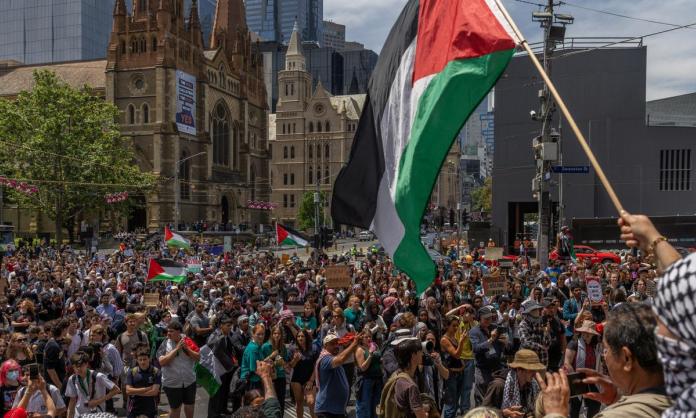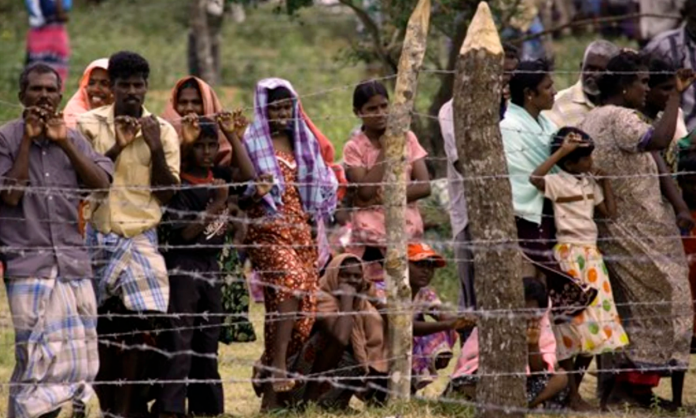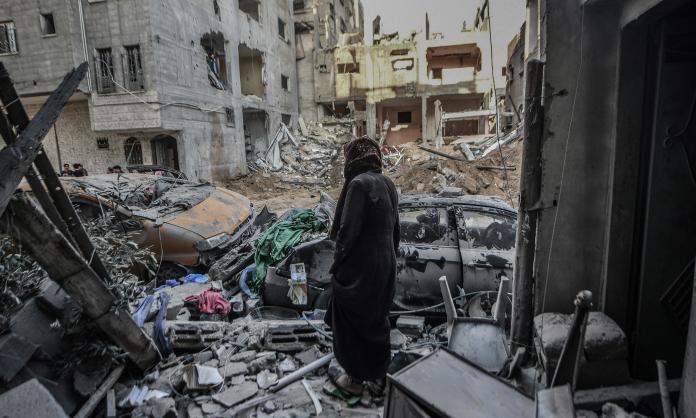Thousands of high school and university students across Australia ditched class on 29 February to protest in solidarity with Palestinians who continue to face severe privation, displacement and murder as part of Israel’s genocidal war on Gaza.
The action was organised by Students for Palestine, an activist collective with a presence at universities across the country. It comes in the wake of one of the world’s largest school walk-outs for Palestine last December, and more recent student-led protest occupations of major train stations. More than 1,000 rallied in Melbourne, while several hundred attended the protest in Sydney and hundreds more in Canberra, Brisbane, Wollongong and other cities.
In Melbourne, chants of “From the river to the sea, Palestine will be free!” bellowed through the streets, as students marched and occupied a nearby shopping centre. The overwhelming sentiment from rally speakers and attendees was one of refusal: a refusal to accept the genocidal crimes committed by Israel in collaboration with its allies.
To university student Eloise, there is no shortage of stories encapsulating the urgency of keeping up the Palestine solidarity movement. “I read yesterday that a Gazan child was fed bird seeds, because that’s the only food they had access to. And that kid died”, they told Red Flag. “There’s no food entering Gaza. I’m here for that kid.”
For high school student Ariel, “supporting our brothers and sisters in Palestine, who have been suffering for many years”, was a given. So was the fact that mainstream politicians are no friend of Palestine: “Who else will care about the thousands of Palestinians who’ve been killed, if not us?”
Supporters of Palestine are used to being ridiculed and slandered by Israel’s allies in parliament, boardrooms and the media. But when young people in particular speak up for Palestine, the condemnation from the mainstream is also steeped in condescension. Young people, so we’re told, are simply too naive to understand the nature of Israel and its conduct toward Palestinians.
Those protesting thought otherwise.
“Politicians should go and study the history books”, Iza, university student, quipped. “I’m from Poland, and that’s where the Holocaust happened. If that taught me anything, it’s that I don’t want anything like that to happen again. But it’s happening in front of our eyes, and we need to speak up about it.”
“Politicians talk a lot about education”, said another university student, Zara. “But education is about what’s happening in the world. Education is about change.”
The question of how to achieve social justice was taken up in Melbourne by Victorian Socialists member Jerome Small. He told the crowd about how he was politicised by the movement against South African apartheid as a high school student, how he was often told that that regime would never fall, but how mass struggle—outside South Africa but most importantly by Black workers within it—eventually smashed apartheid.
The lesson, he told protestors, is simple: “You can fight, and you can win. Don’t let them tell you otherwise”. That lesson is being learned by a new generation: as another high schooler told Red Flag, “We can’t be complacent. This is just too important.”
In their collective defiance, high school and university students are offering us all an invaluable lesson on the courage and conviction that solidarity with Palestine demands.







